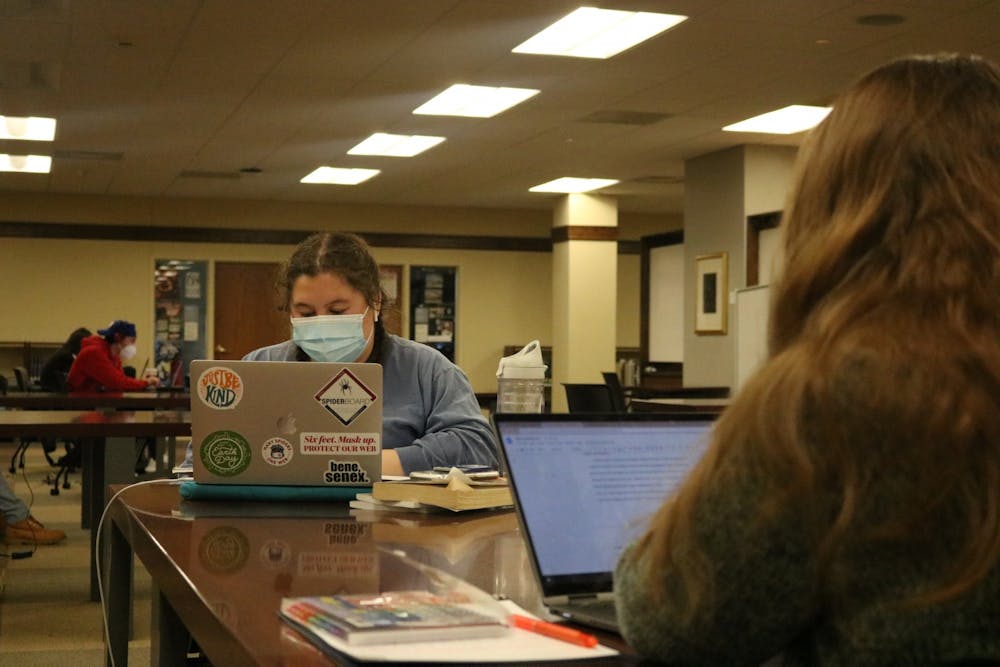Editor's Note: This article has been updated to reflect that Boland did not specifically reference the removal of cameras in her statement about technology that allows live class sessions.
University of Richmond students and faculty who have made a return to in-person learning after a year and a half of virtual and hybrid instruction have expressed confusion regarding UR's classroom protocol for when students are exposed to or test positive for COVID-19.
Jeffrey Legro, UR executive vice president and provost, announced on Aug. 23 that UR would offer no blended teaching options for the school year in an email statement sent to students.
"There will be no synchronous, real-time, online instruction of students not in the classroom," Legro wrote. "The feedback received from both faculty and students is that our community is best served by a return to in-person learning with the use of remote classes when they are needed under extraordinary circumstances."
However, professors may offer a class meeting in which all students are remote if the professor is "unavoidably away during class time or it serves a pedagogical purpose for a particular class session," according to the email.
There is no longer technology in classrooms that allow students to attend a live class sessions while in isolation, Linda Boland, UR's associate provost for faculty and director of the teaching and scholarship hub, wrote in a Sept. 16 email to The Collegian.
"The professor determines how to handle the continuity of instruction including such measures as -- but not limited to -- providing taped class sessions, readings, office hours on Zoom, collaborative documents, notes, or any other measures," Boland wrote. "They have a host of options to use, and depending on the nature of the class, they will choose methods to assist a student who is absent to be able to continue learning.
"We ask for effective communication between faculty member and student -- a two way street -- and there will be differences in how different professors handle this."
After testing positive for COVID-19 during the first week of classes, senior Becca Rubenstein asked her professors if she could Zoom into class so that she could keep up with her work, she said.
"Two of the [professors] said yes right away, but I had to meet with the other two to convince them to let me," Rubenstein said regarding remote instruction during her eight day period of isolation. "One ended up letting me Zoom in, and the other recorded the sessions and sent them to me."
Junior Jake Holm said some of his professors had also addressed the possibility of a hybrid format if a student tested positive for COVID-19. Holm thinks UR guidelines excluding the possibility of online instruction could possibly lead students to not be open about potential symptoms, he said.
"Even if I possibly do have COVID, the idea of not going to class and missing all that content is a bit nerve-wracking," Holm said. "It definitely discourages [people] from being totally transparent about what you might have just because you don't want to, you know, lose out on that class."
Enjoy what you're reading?
Signup for our newsletter
Joanna Drell, the chair of the history department, is not allowing students to Zoom into class and is instead offering virtual office hours for students worried about missing lessons, she said.
"I taught remotely all of last year from my home," Drell said. "And this year, when I was getting my tour of [Ryland Hall] and saw which classroom I was using, my understanding was I didn't need to learn for that classroom how I would do any kind of hybrid teaching because there wasn't going to be any hybrid teaching.
"I do have colleagues who, because the classrooms make it possible and because their technological skills make it possible, they are doing their courses hybrid, and so that is confusing."
Drell has also implemented a buddy system to help combat students from getting behind on the curriculum if they are put in isolation, she said.
"All of my students are paired up in groups of two, so if student number one is out sick, the other student is responsible to share their notes, to tell them what happened in class, that kind of thing."
Although there has been a lack of consistency regarding COVID-19 classroom guidelines, Drell thinks UR's decision to remove hybrid learning was one made out of the best interest of students and professors, she said.
"There were lots of good reasons why Provost Legro was so adamant we would not be doing hybrid teaching, and one of those is that it wasn't working too well last year," she said. "In my role as department chair, I observed other colleagues where you couldn't hear the discussion of the students. There were terrible sound problems, so as one of the people zooming into the class, I was at a horrible disadvantage."
Students who display symptoms of COVID-19 should contact the Student Health Center and follow its guidance, as well as reach out to their dean's office if they have concerns of missing class, Westhampton College Dean Mia Reinoso Genoni wrote in a Sept. 7 email statement to The Collegian.
Contact managing editor Meredith Moran at meredith.moran@richmond.edu.
Support independent student media
You can make a tax-deductible donation by clicking the button below, which takes you to our secure PayPal account. The page is set up to receive contributions in whatever amount you designate. We look forward to using the money we raise to further our mission of providing honest and accurate information to students, faculty, staff, alumni and others in the general public.
Donate Now



